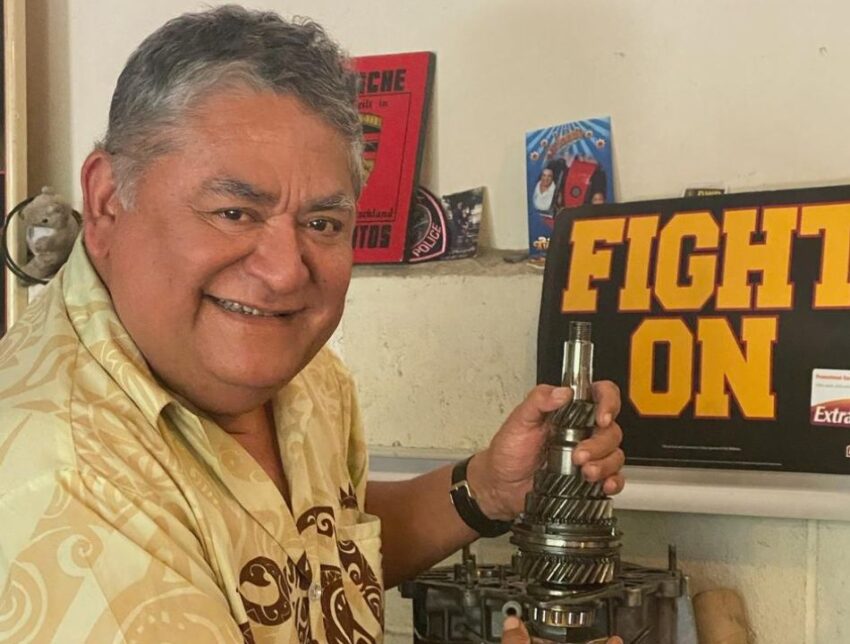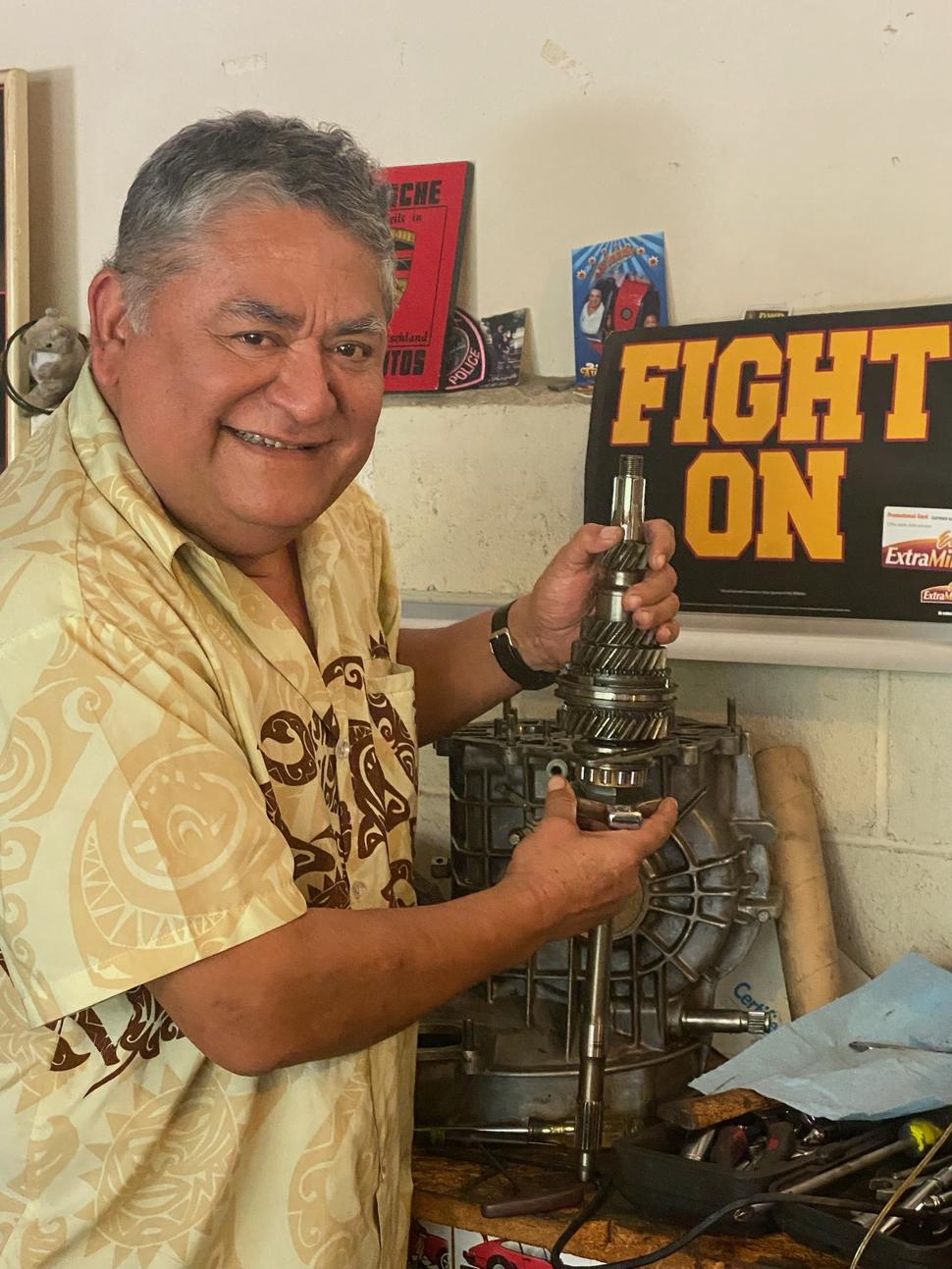
Share On Social!
Colorectal cancer is a leading cause of cancer death among people of Hispanic and Latino descent in the United States. Adan Reinosa Rivera, a retired electrical engineer in Los Angeles, is doing his part to change that.
Mr. Reinosa has been living with metastatic colorectal cancer for more than a decade. The cancer was detected in his lungs a few months after a tumor was removed from his colon. He’s been managing the disease with his doctor ever since.
Now, as the first participant in a genetic study called ENLACEExit Disclaimer, Mr. Reinosa is helping to build a body of knowledge about the molecular features of colorectal cancers in Hispanic and Latino people.

The study, supported by the Cancer MoonshotSM, aims to learn more about the disease in people of Hispanic and Latino descent, with the ultimate goal of improving treatments for this population group. And to achieve this aim, investigators are also testing ways to engage more people from this group in cancer research.
Mr. Reinosa, who is 65 years old and restores classic sports cars in his free time, is helping with both goals. He has provided blood and tumor samples for analysis with genomic tools such as DNA sequencers. And he is part of the study’s patient advisory panel, which is developing ideas about how to engage potential participants and improve the research experience.
“I hope my feedback will help the study better serve other people in our community,” Mr. Reinosa said.
Genetic Counselors Help Participants Understand their Test Results
ENLACE is the first study to use cutting-edge technologies to describe the molecular features of colorectal tumors in Hispanic and Latino people. Researchers plan to enroll 500 participants with all forms of colorectal cancer.
Tumor samples and blood from these participants will be analyzed for genetic changes linked to colorectal cancer, both those that arose during the development of the cancer as well as those that were inherited from a parent.
“What’s exciting is that we are doing genetic testing in a patient population that would not have had the testing outside of this study,” said Heinz-Josef Lenz, M.D., of the USC Norris Comprehensive Cancer Center in Los Angeles, who is co-leading the research.
Dr. Lenz said he has already identified genetic mutations in the tumors of some participants and has used that information to help guide treatment decisions.
The ENLACE team includes bilingual genetic counselors who are trained in culturally sensitive
ways of communicating genetic information. They meet with participants before testing to explain in accessible language how genetic testing for colorectal cancer works.
The genetic counselors also help participants understand their test results. For example, if a participant were found to have an inherited genetic mutation linked to cancer, a counselor could explain how the finding would affect cancer screening and prevention for the participant and the person’s family in the future.
“We want our patients to understand what these tests mean for themselves and their care,” said study co-leader Mariana C. Stern, Ph.D., also of the Norris Comprehensive Cancer Center. “We also want to empower patients to ask questions of their health care providers.”
The researchers are also asking participants about aspects of their lifestyles and diets that may contribute to the risk of colorectal cancer. Other questions focus on social, economic, and physical factors that can affect a person’s health and well-being, such as where the person was born and where they are currently living. Such factors are known as social determinants of health.
Rising Rates of Early-Onset Colorectal Cancer
Diagnoses of colorectal cancer in adults under age 50 have been increasing around the world, particularly in high-income countries. In the United States, the incidence of such early-onset tumors has risen more rapidly in Hispanic and Latino people than in those of any other racial and ethnic groups.
“We really do not understand why there has been a steep increase in early-onset colorectal cancer among Hispanics,” Dr. Lenz said.
To address this gap in knowledge, he teamed up with John Carpten, Ph.D., who was then chair of translational genomics at the Keck School of Medicine of USC. With Cancer Moonshot funding, they launched the Center for Optimization of Participant Engagement for Cancer Characterization, which includes ENLACE.
Their hope is that the study could also help reveal some clues about the rising incidence of early-onset colorectal cancer. “Expanding the participation of Hispanics and Latinos with colorectal cancer in genomic research is critical for making progress against the disease,” Dr. Lenz said.
A National Network for Improving Participant Engagement
The USC participant engagement center is one of five such centers in the Participant Engagement and Cancer Genome Sequencing (PE-CGS) NetworkExit Disclaimer. Each is investigating understudied cancers or populations of patients.
The centers all have two main aims: to promote and support the engagement of participants in cancer research, and to learn more about the biology of understudied cancers in diverse populations.
The engagement aim reflects an expanded idea of what it means to participate in cancer research. Participant engagement is increasingly viewed as a mutually beneficial relationship between researchers and participants, according to an analysis led by PE-CGS researchers at The Ohio State University.
“The idea is that the research experience supports learning and sharing between participants and researchers, where the relationship is ongoing to foster continuous growth,” said study leader Anne Schuster, Ph.D., of The Ohio State University College of Medicine.
To achieve this, the research centers are exploring ways to enhance the engagement of participants throughout their studies, starting with making the recruitment phases more inviting. They’re also investigating ways to address historical barriers to participation, such as poor access to research facilities or lack of trust in medical research.
“Our focus is on involving groups of people who have historically not been part of research on cancer genomics,” Dr. Schuster said.
The PE-CGS Network was created with a goal of ensuring that underserved communities eventually benefit from the latest advances in cancer medicine, noted Leah Mechanic, Ph.D., of NCI’s Division of Cancer Control and Population Sciences and the NCI lead for the network.
“Through participant engagement,” she continued, “the network has the potential to improve the recruitment and retention of historically underserved and underrepresented populations in research.”
Expanding Awareness of Recommended Cancer Screenings
ENLACE is an example of patient-centered care, Dr. Stern said.
“We are providing patients with knowledge and listening to their concerns and questions so that we can optimize our study,” she said.
Some opportunities to improve the study have begun to emerge. For instance, the questionnaires that participants answer about their health and about the study itself can take hours to complete, the researchers have learned. The time commitment can be a burden for busy participants, Dr. Lenz noted, adding that his team will explore ways to collect the information in less time.
On a positive note, many participants have made sure that family members get screened for colorectal cancer if they are eligible. Participation in the study, Dr. Lenz suggested, may start conversations about the importance of staying current on all recommended cancer screenings, including tests for breast and cervical cancer.
“We might save more lives among family members than among the patients themselves,” he said. “A few months after treating a patient, I often hear that one of the person’s relatives had a very bad polyp removed. The families are so appreciative.”
Helping Other People with Colorectal Cancer
Mr. Reinosa recently received the results of a genomic analysis of one of his metastatic tumors. The analysis revealed a genetic change that his doctors said could potentially play a role in the growth of the cancer and could be a potential target for treatment.
But the doctors cautioned that more research is needed to determine the finding’s significance. “It could be nothing, or it could be something,” said Mr. Reinosa. “That’s what research is for—answering these kinds of questions.”
He remains optimistic.
“I’m confident that scientists will learn something from my tumor that will help someone else with colorectal cancer, if not me.”
Editor’s Note: This article and photos were originally published by the National Cancer Institute (NCI) with the title, “ENLACE Study Explores Colorectal Cancer in Hispanic and Latino People was originally published by the National Cancer Institute.” The article and photos were republished here with permission from NCI.
By The Numbers
142
Percent
Expected rise in Latino cancer cases in coming years
This success story was produced by Salud America! with support from the Robert Wood Johnson Foundation.
The stories are intended for educational and informative purposes. References to specific policymakers, individuals, schools, policies, or companies have been included solely to advance these purposes and do not constitute an endorsement, sponsorship, or recommendation. Stories are based on and told by real community members and are the opinions and views of the individuals whose stories are told. Organization and activities described were not supported by Salud America! or the Robert Wood Johnson Foundation and do not necessarily represent the views of Salud America! or the Robert Wood Johnson Foundation.



